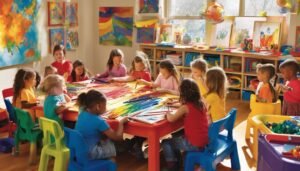Engaging with peers in early childhood not only enhances social skills but also fosters emotional intelligence. The benefits of peer interaction go beyond just these two aspects, offering a myriad of advantages that contribute to a child's overall development.
From cognitive stimulation to the cultivation of problem-solving abilities, the impact of peer relationships during these formative years is profound. As you explore the various benefits that peer interaction brings, you will uncover a wealth of advantages that shape children into well-rounded individuals with strong interpersonal skills and a deep understanding of others.
Key Takeaways
- Peer interactions in early childhood foster essential social skills development.
- Emotional intelligence flourishes through peer interactions, nurturing empathy and conflict resolution.
- Cognitive abilities are stimulated by engaging with peers, enhancing problem-solving and critical thinking.
- Early peer interactions lay a strong foundation for future personal growth, resilience, and success.
Enhances Social Skills
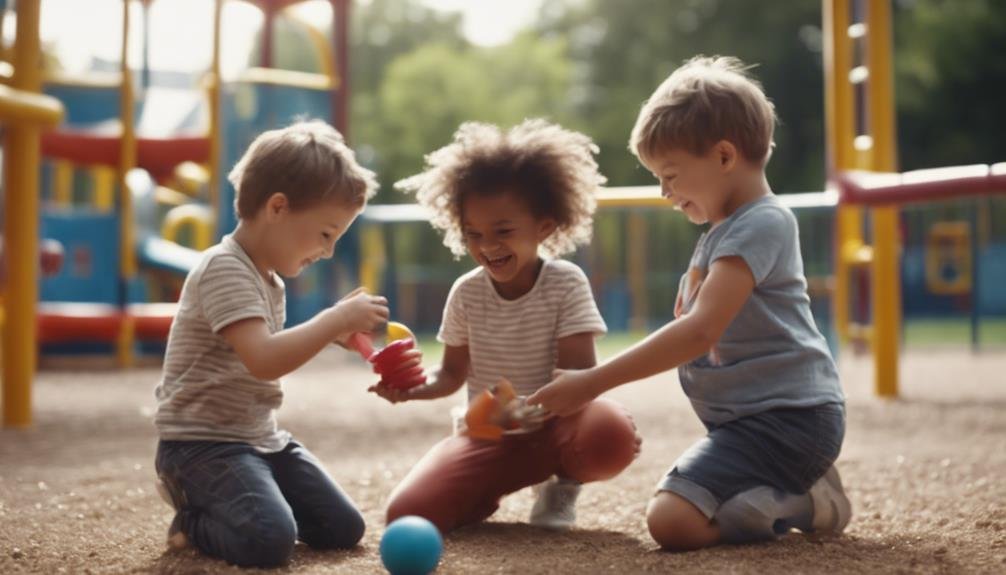
Engaging in peer interaction during early childhood greatly enhances the development of important social skills, fostering empathy and teamwork abilities essential for future success. Friendship dynamics play a critical role in shaping these skills. Through interactions with peers, children learn to navigate the complexities of relationships, understanding the give-and-take essential for maintaining friendships. These early experiences help lay the foundation for building strong, meaningful connections in the future.
Play therapy is a powerful tool in honing social skills through peer interaction. By engaging in imaginative and cooperative play with their peers, children learn valuable lessons in communication, problem-solving, and conflict resolution. Play scenarios often mirror real-life situations, allowing children to practice essential social skills in a safe and supportive environment.
Fosters Emotional Intelligence
To further your understanding of the importance of peer interaction in early childhood, let's explore how it fosters emotional intelligence, a key aspect of social development. Engaging with peers in various social settings can greatly impact a child's emotional understanding and ability to form strong social connections. Here are five ways peer interaction fosters emotional intelligence:
- Empathy Development: Interacting with peers allows children to understand and share the feelings of others, fostering empathy.
- Conflict Resolution Skills: Through peer interactions, children learn to navigate conflicts, developing vital skills in managing emotions and finding solutions.
- Emotional Regulation: Peer interactions provide opportunities for children to practice regulating their emotions in different situations.
- Building Trust: Forming relationships with peers helps children build trust and learn the importance of emotional bonds.
- Self-Awareness: Peer interactions can enhance self-awareness by reflecting emotions and behaviors off others.
These facets of emotional intelligence are nurtured through peer interactions, laying a strong foundation for healthy social connections and emotional understanding in early childhood.
Stimulates Cognitive Development
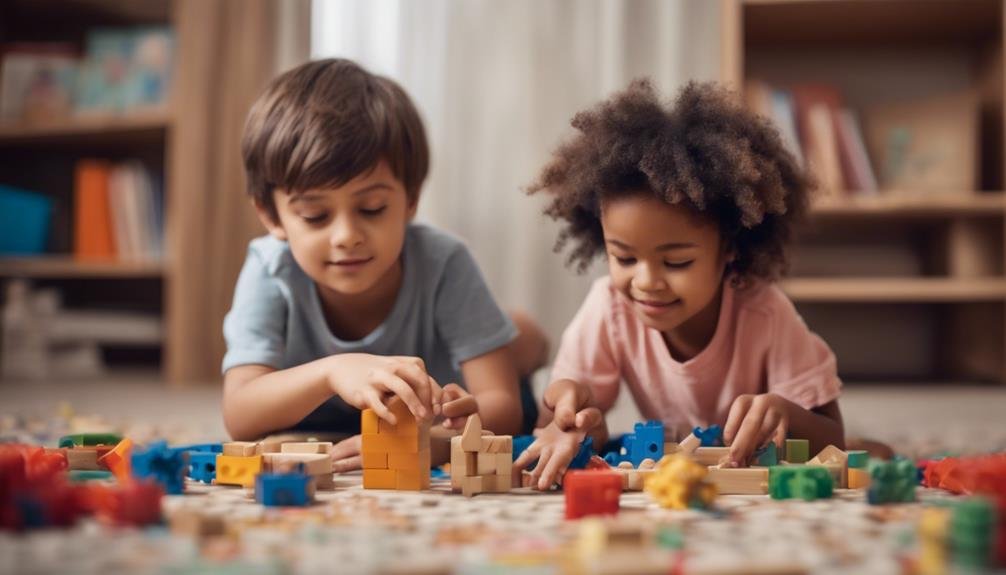
Interacting with peers in early childhood settings stimulates cognitive development by fostering collaborative problem-solving skills and enhancing critical thinking abilities. Through engaging with peers, children are presented with diverse perspectives and unique challenges that prompt them to think creatively and analytically. In these social interactions, kids learn to evaluate different ideas, communicate their thoughts effectively, and work together to find solutions. These experiences not only sharpen their critical thinking skills but also nurture their ability to think outside the box when faced with complex problems.
Additionally, peer interaction provides a platform for children to practice flexible thinking and adaptability. When collaborating with others, youngsters are encouraged to ponder alternative viewpoints and explore various approaches to resolving issues. This exposure to different ways of thinking fosters cognitive flexibility and enhances their capacity for creative problem-solving. By engaging in discussions, debates, and group activities, children not only expand their cognitive skills but also develop a deeper understanding of diverse perspectives, ultimately enriching their cognitive development in meaningful ways.
Encourages Empathy and Compassion
Encouraging empathy and compassion in early childhood is crucial for fostering positive social interactions and emotional development in children. Developing emotional understanding and kindness from a young age sets the foundation for healthy relationships and a more empathetic society.
Here are some key ways peer interaction encourages empathy and compassion:
- Enhances Emotional Understanding: Interacting with peers helps children recognize and understand different emotions, fostering empathy towards others.
- Promotes Kindness Development: Through shared experiences, children learn to show kindness and consideration for their peers, developing a sense of compassion.
- Encourages Perspective Taking: Interacting with peers allows children to see situations from different viewpoints, promoting empathy and understanding.
- Builds Emotional Resilience: Peer interactions provide opportunities for children to navigate conflicts, fostering compassion and emotional growth.
- Strengthens Social Bonds: Positive peer interactions create a sense of belonging and connection, nurturing empathy and compassion in children.
Engaging with peers not only enriches children's lives but also contributes to a more empathetic and compassionate society as they grow.
Builds Communication Skills
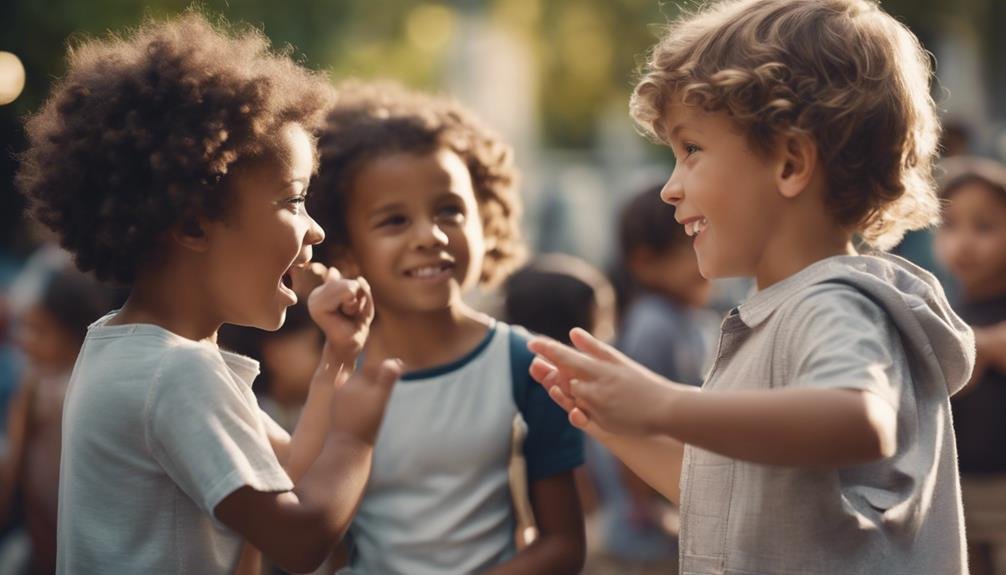
Engage with peers to develop strong communication skills essential for effective social interaction and personal growth. Active listening and turn-taking are vital components of effective communication that children can cultivate through peer interaction. By actively engaging in conversations, children learn to listen attentively to their peers, understand their perspectives, and respond thoughtfully. This not only enhances their communication skills but also fosters empathy and understanding towards others.
| Active Listening | Turn Taking |
|---|---|
| Focus on speaker | Wait for your turn |
| Ask questions | Share the conversation |
| Show interest | Respect others' opinions |
| Repeat key points | Take equal speaking turns |
Practicing active listening helps children comprehend the importance of respecting others' viewpoints and encourages them to express their thoughts clearly. Turn-taking teaches them the significance of patience, cooperation, and effective communication in maintaining healthy relationships. These skills lay a strong foundation for their future social interactions and academic success.
Boosts Self-Confidence
Building self-confidence in early childhood starts with fostering positive interactions with peers that nurture a sense of belonging and accomplishment. These interactions play an important role in shaping a child's self-perception and confidence levels.
Here are five key ways peer interaction boosts self-confidence:
- Encourages Independent Exploration: Through interactions with peers, children learn to trust their abilities and explore the world around them independently.
- Fosters Personal Growth: Peer interactions provide opportunities for children to receive feedback, set goals, and work towards personal development.
- Strengthens Social Dynamics: By engaging with peers, children learn to navigate social situations, understand different perspectives, and build meaningful relationships.
- Promotes a Sense of Belonging: Being part of a peer group helps children feel accepted, valued, and connected, which boosts their self-worth.
- Celebrates Accomplishments: Peer interactions create a supportive environment where children can celebrate successes, boosting their self-esteem and confidence.
These aspects collectively contribute to a child's overall self-assurance and belief in their capabilities, laying a strong foundation for future growth and development.
Cultivates Problem-Solving Abilities
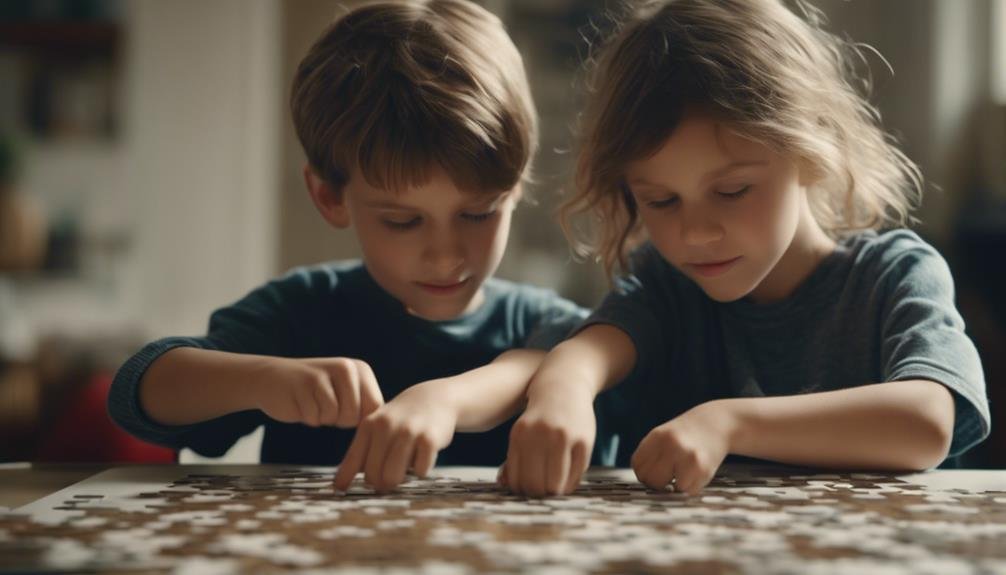
In your early interactions with peers, you naturally develop problem-solving abilities that lay the foundation for critical thinking skills later in life. Through these interactions, you begin to maneuver various social situations, each presenting its unique set of challenges. As you collaborate with your peers to overcome obstacles, you learn to think critically and consider different perspectives. This process of working together fosters not only your problem-solving skills but also enhances your collaboration skills.
Research indicates that children who engage in peer interactions from a young age tend to exhibit higher levels of critical thinking abilities as they grow older. By facing and resolving conflicts within these interactions, you're honing your ability to analyze situations, think creatively, and make informed decisions. These experiences lay a solid groundwork for developing the problem-solving skills necessary for navigating the complexities of adulthood. Embracing these challenges with your peers not only cultivates your critical thinking but also strengthens your collaborative skills, preparing you for future success in various aspects of life.
Strengthens Peer Relationships
How do peer interactions in early childhood contribute to the strengthening of relationships among children? Engaging in group play and cooperative learning activities with peers not only fosters social skills but also deepens the bonds between children.
Here are five ways in which these interactions can enhance peer relationships:
- Building Trust: Through shared experiences and collaborative play, children learn to trust and rely on each other.
- Enhancing Communication: Interacting with peers encourages children to communicate effectively, express their thoughts, and listen to others.
- Developing Empathy: By engaging in cooperative activities, children learn to contemplate their peers' feelings and perspectives.
- Fostering Teamwork: Collaborating on tasks helps children understand the value of working together towards a common goal.
- Creating Lasting Friendships: Strong peer relationships formed through group play can evolve into long-lasting friendships, providing emotional support and companionship.
Frequently Asked Questions
How Can Peer Interaction in Early Childhood Impact a Child's Long-Term Relationships With Their Peers?
Interacting with peers in early childhood lays the foundation for long-term relationships. Through play and communication, children develop social skills and emotional intelligence, fostering strong friendships. These early connections shape how you relate to others throughout life.
Are There Specific Strategies Parents Can Use to Encourage Positive Peer Interactions in Their Children?
To foster positive peer interactions in your child, model cooperation and empathy. Encourage sharing and taking turns during playtime. Building social skills early sets a foundation for lifelong relationships. Did you know that children with strong social skills are more likely to succeed academically?
Can Peer Interaction in Early Childhood Help Children Develop a Sense of Identity and Belonging?
Engaging with peers in early childhood can greatly influence your sense of self and boost your social skills. Through interactions and connections with others, you develop a stronger identity and a sense of belonging.
What Role Does Peer Interaction Play in Helping Children Learn How to Navigate Conflicts and Disagreements?
Handling conflicts and disagreements with peers is an essential part of your social development. Through this process, you learn valuable lessons in conflict resolution and practice essential social skills that will benefit you throughout your life.
How Does the Quality of Peer Interactions in Early Childhood Affect a Child's Overall Well-Being and Mental Health in the Future?
When you experience positive peer interactions in early childhood, your emotional regulation and social skills develop. These interactions nurture your self-esteem and resilience, shaping your overall well-being and mental health for the future.
Conclusion
To sum up, interacting with peers in early childhood is like planting seeds in a garden – it nurtures growth, connection, and learning. These interactions not only enhance social skills and emotional intelligence, but also stimulate cognitive development and build important life skills.
By fostering empathy, communication, and problem-solving abilities, peer interactions lay the foundation for strong relationships and self-confidence. So, let your little ones blossom through the power of peer interaction!



